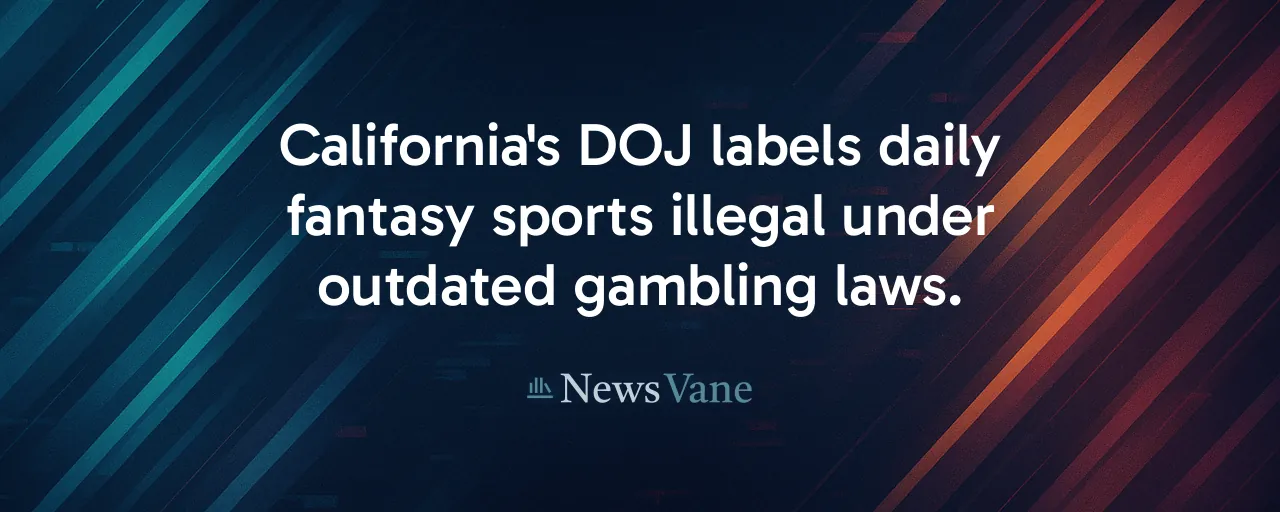A Legal Curveball Hits Fantasy Sports
On July 3, 2025, the California Department of Justice issued a significant legal opinion, declaring daily fantasy sports (DFS) illegal under state law. The ruling, prompted by Assemblymember Tom Lackey's request, labeled platforms like DraftKings and FanDuel as violating anti-wagering statutes. This opinion doesn't change the law but signals potential crackdowns, leaving millions of players, operators, and policymakers in a high-stakes game of uncertainty.
The announcement prompted strong reactions. For California's estimated 4 to 5 million fantasy players, the news raised questions about access to a beloved pastime. Operators now face the threat of enforcement, while tribal casinos argue that DFS undermines their exclusive gaming rights. The stage is set for a broader conversation about how to handle this modern phenomenon in a state with a complex history of gaming regulation.
The Law Behind the Call
California's Penal Code Section 337a, rooted in 19th-century anti-bookmaking laws, bans wagers on athletic contests. The DOJ's opinion applied this rule, arguing that DFS involves betting on athlete performances, with outcomes swayed more by chance than skill. This 'predominance of chance' test underpins the conclusion that both pick'em-style and traditional salary-cap DFS formats cross the legal line.
Legal opinions from the Attorney General, while not binding, carry weight. Past rulings, like the 2012 sweepstakes café crackdown, led to local enforcement and shutdowns. The DFS opinion could spark similar actions, with local prosecutors and regulators now tasked with deciding whether to act. However, the law's age raises questions about its fit for a digital era, where DFS thrives on data-driven decisions.
Players, Tribes, and Dollars at Stake
The stakes extend beyond courtrooms. DFS operators employ thousands and fuel sponsorships with professional sports teams. A ban could erase millions in payrolls and advertising revenue. Conversely, regulation might unlock $200 to $300 million in annual state tax revenue, potentially funding homelessness or mental health programs. The economic ripple effects touch everyone from media partners to payment processors.
Tribal nations, with 63,000 gaming-related jobs, see DFS as a threat to their constitutional exclusivity over Las Vegas-style gaming. Their compacts with the state grant sole rights to certain wagering, and unregulated DFS feels like an end-run by tech firms. Meanwhile, players advocate for access to a game they view as skill-based entertainment, separate from traditional wagering.
Skill or Chance? The Data Weighs In
Research offers clarity on the skill-versus-chance debate. Studies show traditional salary-cap DFS, where players build rosters under budget constraints, rewards experience and strategy. Skilled entrants consistently outperform novices, suggesting a measurable edge. However, pick'em contests, with their parlay-like structure, tilt closer to chance, resembling sportsbooks' house-edge models.
This distinction matters. States like New York and Colorado regulate DFS as a skill game, with consumer protections like age verification and deposit limits. California's blanket classification of all DFS as wagering sidesteps these nuances, potentially oversimplifying a complex issue. The data suggests a middle path: treat formats differently based on their mechanics.
Lessons From the Past
California's debates over gaming activities are nothing new. In 2015, DraftKings and FanDuel faced scrutiny, but no laws passed. The 2022 sports betting ballot initiatives collapsed amid tribal opposition, showing the power of entrenched interests. These failures highlight a recurring challenge: balancing innovation with established agreements.
The 2012 sweepstakes café opinion offers a cautionary tale. After the Attorney General's ruling, local enforcement shuttered operations, but the lack of legislative follow-up left gaps. Today's DFS situation risks a similar patchwork, with counties pursuing inconsistent prosecutions unless lawmakers act.
A Path to Common Ground
Solutions exist that could satisfy competing interests. A licensing regime for traditional DFS, with revenue sharing for tribes and a public-benefit fund, could preserve access while addressing exclusivity concerns. Defining skill-based formats as distinct from pick'em parlays might narrow the legal fight. Sunset clauses could allow data collection on social impacts before locking in permanent rules.
A joint task force of legislators, tribal leaders, and industry voices could craft uniform standards, ensuring consumer protections like age checks and support for responsible gaming. Such compromises require trust and dialogue, but they've worked in states that legalized DFS with clear rules.
Protecting Players, Preserving Rights
Prioritizing consumer safety is crucial for any approach. DFS correlates with manageable risks associated with problem gaming, but prohibition could push players to unregulated offshore sites with no safeguards. Regulation, with tools like geolocation and deposit caps, offers a safer alternative. Tribes, meanwhile, deserve a seat at the table to protect their economic lifeline.
The Legislature holds the reins. Article IV, Section 19 of the California Constitution grants lawmakers authority to permit lotteries, and DFS could fit under a modernized framework. A balanced policy would respect tribal compacts, protect players, and harness economic potential.
The Path Forward
California faces a critical juncture. The DOJ's opinion has clarified the law but not the future. Without action, the state risks a messy enforcement landscape or a missed opportunity to lead on responsible gaming. Players, tribes, and operators await a resolution that respects all sides.
The debate focuses on crafting a system that upholds fairness, protects vulnerable players, and adapts to a digital age. California has tackled tough issues before. With clear thinking and bold leadership, it can find a way to keep the game alive.
